How to define a structure type?
struct Student
{
int num;
char name[2];
int age;
}**;**
The first letter is capitalized, and the structure name must reflect the function of the structure (self annotation)
Function cannot be saved in structure: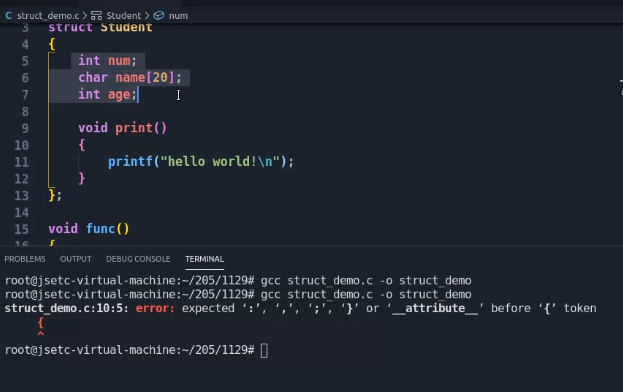
Solution: save function pointer example:
struct Student
{
int num;
char name[2];
int age;
void (*func)();
}**;**
void print()
{
peintf("hello world\n");
struct Student stu = {1,"zhangsan",12,**.func = print**};
Structure type definition variables:
struct Student stu;
initialization:
Pay attention to the problem of wild pointers, and directly assign values to array names (pointer constants)
struct Student stu = {1,"zhangsan",12};
struct Student stu2 ={
.num = 1,
.name = "lisi",
.age = 15
};
How to access members of structure variables?. - >
printf("stu.num = %d\n",stu2.num);
printf("stu.name = %s\n",stu.name);
struct Student *pstu = &stu;//*pstu = stu;
printf("stu.num = %d\n",**(*pstu)**.num);
printf("stu.num = %d\n",pstu->num);//(*pstu).num
printf("stu.num = %d\n",(&stu)->num);
struct Student stu3;
scanf("%d",&(stu.num));
scanf("%d",stu.name);
scanf("%d",&(stu.age));
Wild pointer processing:
struct Student
{
int num;
char *name;// char name[20];
int age;
void (*func)();
};
struct Student stu3;
scanf("%d",&(stu.num));
*stu.name = (char )malloc(sizeof(char) * 100);
if(NULL == stu.name)
{
printf("malloc error!\n");
exit(1);
}
scanf("%d",stu.name);
free(stu.name);
stu.name = NULL;
Assignment between structures: shallow copy
#include <stdio.h>
#include <stdlib.h>
#include <string.h>
struct Student
{
int num;
char name[20]; //char *name;
int age;
void (*func)();
};
void print()
{
printf("hello world!\n");
}
int main(int argc, char **argv)
{
struct Student stu = {1, "zhangsan", 12, .func = print};
struct Student stu2 = {
.num = 1,
.name = "lisi",
.age = 15,
.func = print};
struct Student *pstu = &stu; //*pstr = stu;
printf("stu.num = %d\n", stu2.num);
printf("stu.name = %s\n", stu.name);
printf("stu.num = %d\n", (*pstu).num);
printf("stu.name = %s\n", (*pstu).name);
printf("stu.num = %d\n", pstu->num); //(*pstu).num;
printf("stu.num = %d\n", (&stu)->num);
struct Student stu3;
printf("input num:\n");
scanf("%d", &(stu3.num));
strcpy(stu3.name, "zhangsan");
printf("input age:\n");
scanf("%d", &(stu3.age));
printf("stu3.num = %d stu3.name = %s stu3.age = %d\n", stu3.num, stu3.name, stu3.age);
struct Student stu4;
stu4 = stu3;
return 0;
}
Deep copy: encapsulating functions

Precautions for use of structure:
Word alignment leads to empty memory and puts the same types together
Exceptions:
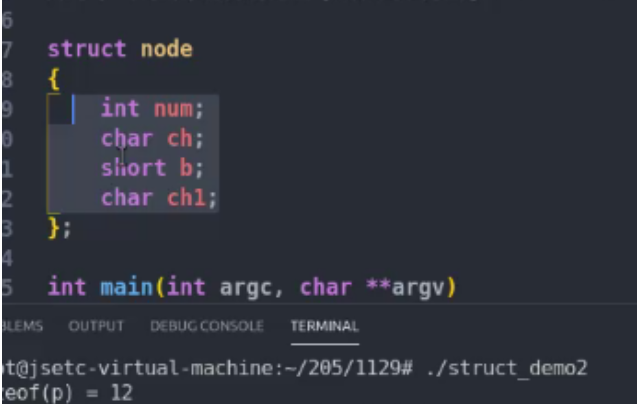
Members with a length greater than or equal to 4 bytes are aligned according to the maximum byte
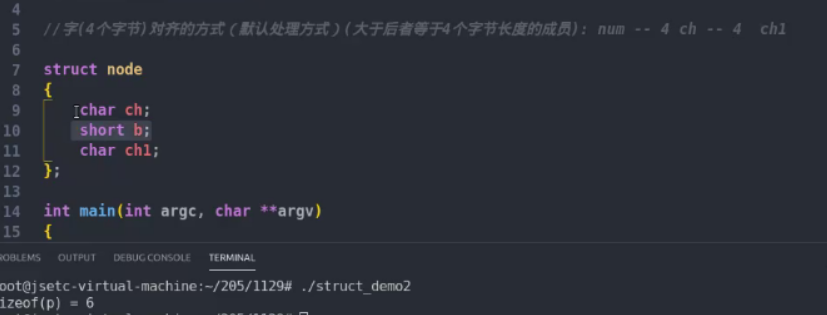
Structure function: encapsulate data (package data) - abstract data
Structure array:
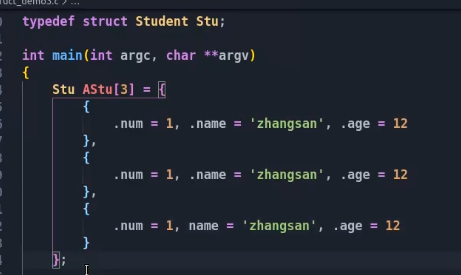

Flexible array: (implementation of variable length array in C language)
#include <stdio.h>
struct node
{
int len;
char src[0];
};
typedef struct node Array;
int main(int argc,char **argv)
{
printf("sizeof(node) = %ld\n",sizeof(struct node));
Array a;
a.len = 100;
a.src = (char *)malloc (sizeof(char)* 100);
a.src = (char *)realloc (sizeof(char)* Original byte length);
return 0;
}
union community:
union uses: defining types, defining variables and pointers, and initializing
union Student
{
int num;
char ch;
};
int main()
{
union Student stu = {.num = 1,.ch = 'a'};
union Student *pstu = &stu;
printf("sizeof(stu) = %ld\n",sizeof(stu));
printf("stu.num = %d\n",stu.num);//????
printf("stu.ch = %c\n",spstu->num);
return 0;
}
struct VS union size:
union size:
The maximum byte length of the saved member is determined by the member; (maintain byte alignment like struct)
Storage method: all members share the same memory space (variable with the longest bytes) (data overwrite)
cpu properties:
Big endian byte order: the high byte is written at the low address
Small end byte order: the low byte is written at the low address
! [insert picture description here]( https://img-blog.csdnimg.cn/dcfb8c3f0a0d47e9bba81248f3607710.png?x-oss-process=image/watermark,type_ZHJvaWRzYW5zZmFsbGJhY2s,shadow_50,text_Q1NETiBA5ZWl5Lmf5a2m5LiN5Lya55qE6I-c6bih,size_20,color_FFFFFF,t_70,g_se,x_16
Interview questions:
Using the common body to judge the byte order of the size end of the cpu?
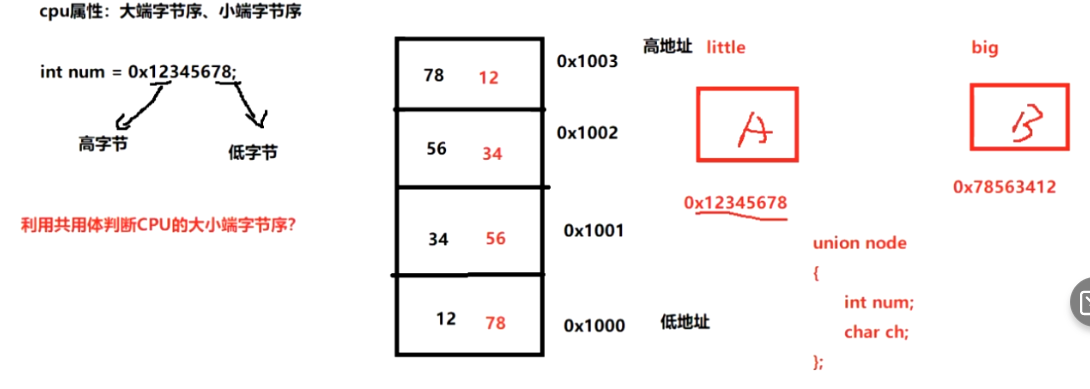
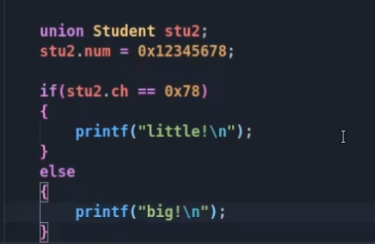
The size end can be verified without union:
int num = 0x12345678;
char *ptr = #
printf("%x\n",*ptr);
Function of union:
#include <stdio.h>
union node
{
int len;
void *ptr;
char sex;
};
void func(union node p,int flag)
{
switch(flag)
{
case 0:
{
printf("len = %d\n",p.len);
break;
}
case 1:
{
printf("%d\n",*((int *)p.ptr));
break;
}
case 2:
{
printf("%c\n",p.sex));
break;
}
int main(int argc,char **argv)
{
union node p;
p.len = 11;
func(p,0);
p.ptr = (void*)#
func(p,1);
p.sex='M';
func(p,2);
return 0;
}
```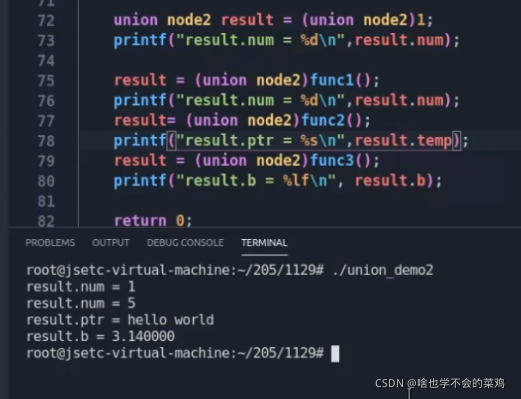
enum Enumeration: defines a series of integer macros
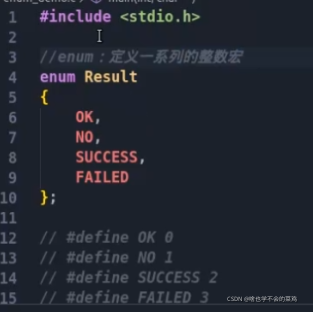
An enumerated variable is equivalent to an integer variable(4 byte)
enum VS define
enum Advantages: it is more convenient to define a series of integer macros; in the compilation stage
define: Pretreatment, unsafe, fool replacement
File operation:
[https://www.cnblogs.com/saolv/p/7793379.html](https://www.cnblogs.com/saolv/p/7793379.html)
FILE:field name pointer
**fopen: **Open a file
```c
#include <stdio.h>
#include <stdlib.h>
int main(int argc, char **argv)
{
FILE *fp;
fp = fopen("/root/205/1129/a.txt","w+");
}
if (fp == NULL)
{
printf("file a.txt error!\n");
exit(1);
}
If the file does not exist, "w" "w +" "a" "a +" is created
**fclose: * * close a file
fclose(fp);
fwrite:
#include <stdio.h>
#include <stdlib.h>
#include <string.h>
int main(int argc, char **argv)
{
FILE *fp;
fp = fopen("/root/205/1129/a.txt","w+");
}
if (fp == NULL)
{
printf("file a.txt error!\n");
exit(1);
}
char buffer [1024] = "hello world";
int ret = fwrite(buffer, 1, strlen(buffer), fp);
printf("ret = %d\n", ret);
fclose(fp);
return 0;
}
fread:
#include <stdio.h>
#include <stdlib.h>
#include <string.h>
int main(int argc, char **argv)
{
FILE *fp;
fp = fopen("/root/205/1129/a.txt","w+");
}
if (fp == NULL)
{
printf("file a.txt error!\n");
exit(1);
}
char buffer [1024] = "hello world";
int ret = fwrite(buffer, 1, strlen(buffer), fp);
printf("ret = %d\n", ret);
memset(buffer, 0, sizeof(buffer));
ret = fread(buffer,ret,1,fp);
buffer[ret] = '\0';
printf("read buffer = %s\n",buffer);
fclose(fp);
return 0;
}
The result read is null
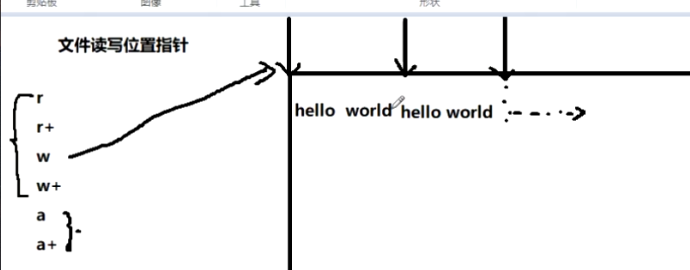
Solution: fseek
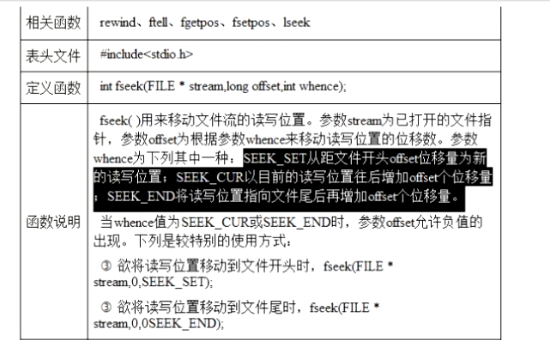
#include <stdio.h>
#include <stdlib.h>
#include <string.h>
int My_fread(void *ptr, size_t size, size_t nmemb, FILE *fp)
{
int ret = fread(ptr,ret,1,fp);
if (ret == 0)
{
printf("%d:fread a.txt error!\n",__LINE__);
exit(1);
}
return ret;
}
int main(int argc, char **argv)
{
FILE *fp;
fp = fopen("/root/205/1129/a.txt","a+");
}
if (fp == NULL)
{
printf("file a.txt error!\n");
exit(1);
}
char buffer [1024] = "hello world";
int ret = fwrite(buffer, 1, strlen(buffer), fp);
fwrite("\n",1,1,fp);
if (ret == 0)
{
printf("fwrite a.txt error!\n");
exit(1);
}
printf("ret = %d\n", ret);
memset(buffer, 0, sizeof(buffer));
fseek(fp, 0, SEEK_SET);
//ret = fseek(fp, -ret, SEEK_CUR);
if (ret == -1)
{
printf("fseek a.txt error!\n");
exit(1);
}
ret = My_fread(buffer, 1, 11, fp);
buffer[ret] = '\0';
printf("read buffer = %s\n",buffer);
fclose(fp);
return 0;
}
**feof() * * is a function to detect the file terminator on the stream. If the file ends, it returns a non-0 value, otherwise it returns 0
**EOF: * * there is a hidden character "EOF" at the end of the document. When the program reads it, it will know that the file has reached the end
**long ftell(FILE *stream); * * used to get the offset of the file pointer from the beginning of the file
#include <stdio.h>
#include <stdlib.h>
#include <string.h>
int My_fread(void *ptr, size_t size, size_t nmemb, FILE *fp)
{
int ret = fread(ptr, 1, 11, fp);
if (ret == 0)
{
printf("%d:fread a.txt error!\n", __LINE__);
exit(1);
}
return ret;
}
int My_read_line(char *ptr, size_t size, size_t memb, FILE *fp)
{
int i = 0;
char temp;
while (!feof(fp))
{
if (fread(&temp, 1, 1, fp) == 0)
{
printf("file fread error!\n");
}
if (temp == '\n')
{
break;
}
ptr[i] = temp;
i++;
}
ptr[i] = '\0';
return i;
}
int main(int argc, char **argv)
{
FILE *fp;
//If the file does not exist, "w" "w+" "a" "a +"
fp = fopen(argv[1], "a+");
if (fp == NULL)
{
printf("file a.txt error!\n");
exit(1);
}
#if 0
//fread \ fwrite
char buffer[1024] = "hello world";
int ret = fwrite(buffer, 1, strlen(buffer), fp);
fwrite("\n", 1, 1, fp);
if (ret == 0)
{
printf("fwrite a.txt error!\n");
exit(1);
}
printf("ret = %d\n", ret);
memset(buffer, 0, sizeof(buffer));
fseek(fp, 0, SEEK_SET);
//ret = fseek(fp, -ret, SEEK_CUR);
if (ret == -1)
{
printf("fseek a.txt error!\n");
exit(1);
}
ret = My_fread(buffer, 1, 11, fp);
buffer[ret] = '\0';
printf("read buffer = %s\n", buffer);
#endif
char buffer[1024];
int ret;
fseek(fp, 0, SEEK_SET);
//Error: cannot read more than one character at a time. It may encounter a terminator, and fread will return 0
// if(fread(buffer, sizeof(buffer) - 1, 1, fp) == 0)
// {
// printf("fread file error!\n");
// exit(1);
// }
//Solution 1:
// int i = 0;
// char temp;
// while(!feof(fp))
// {
// if(fread(&temp, 1, 1, fp) == 0)
// {
// printf("file fread error!\n");
// }
// buffer[i] = temp;
// i++;
// }
// buffer[i] = '\0';
//Solution 2:
// fseek(fp, 0, SEEK_END);
// int file_size = ftell(fp);
// fseek(fp, 0, SEEK_SET);
// fread(buffer, file_size, 1, fp);
while (!feof(fp))
{
My_read_line(buffer, 1, sizeof(buffer) - 1, fp);
printf("buffer = %s\n", buffer);
}
fclose(fp);
return 0;
}
3.36 points